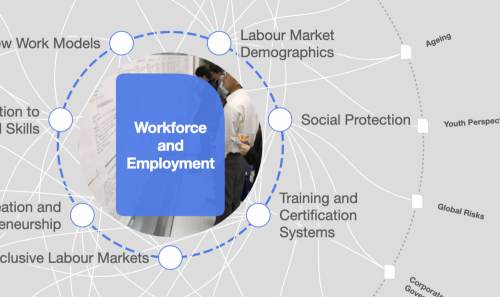
The lack of employment opportunities is a serious concern all over the world, but the situation in Africa has been considerably worse. With over 140 million unemployed youth (between 15 and 35 years of age), it is no wonder African industries and economies are in worse shape than they were a few decades ago.
With the emergence of COVID-19, the dire situation in Africa only got worse. Layoffs and reductions in work hours served as a wake-up call for the entire continent.
Have you read?
There is an overwhelming need to shift youths' efforts from seeking conventional employment to creating marketable opportunities for themselves. Research from The Christensen Institute suggests innovators or corporations that target areas of non-consumption can create significant wealth and, in turn, have considerable transformative developmental influences on society.
Here’s how industry and the general unemployed population in Africa can move toward creating opportunities within the market.
Integrating entrepreneurship and innovation into education
Instead of relying on big businesses to inspire economic growth and create employment opportunities, South Africa needs to focus on scaling efforts to support local innovators with business experience or knowledge. Statistics suggest a considerable number of educated youths in South Africa are unemployed due to the existing obstacles to economic growth.
Kenya, much like South Africa, needs to invest in skills-development programmes for unemployed youth. In the past, unemployment initiatives such as “Kazi Kwa Vijana" have failed to effectively lead to employment for youth. Most of these programmes tend to be labor-intensive and thus target able-bodied youths who – more often than not – do not get the opportunity to pursue higher education. By integrating entrepreneurship and innovation in the school curriculum, African states can give the youth the support needed to create market/employment opportunities. This would help reduce the rate of unemployment among the youth, which in Kenya has been steadily increasing. This is the focus of Africa Teen Geeks in South Africa and beyond. While after-school and weekend enrichment programmes try to address this, they never reach all children, especially those from underserved communities. This is why our approach is to work directly with governments and put innovation and 4IR skills in the school curriculum. Researchers have found that exposure to innovation has a significant effect not just on the kinds of innovation youngsters pursue, but also on their likelihood of becoming innovators. In order to achieve SDG 4 (Quality Education) and SDG 8 (Decent Work and Economic Growth), we need to focus on ensuring education leads to better opportunities and outcomes, irrespective of where children live or who their parents are. Nelson Mandela once said, “There can be no keener revelation of a society’s soul than the way in which it treats its children.” The most telling sign of a nation’s progress towards meeting the Sustainable Development Goals will be how well it meets the needs of its children. There’s no better way but through providing quality education equally. Education is the greatest equalizer – and in many children’s lives, the only way to break the cycle of poverty. One of the most crucial attributes to consider for effective market-creating innovation is the establishment of interdependent architecture. Such interdependent provisions, such as business incubation centres, ensure innovators are protected from uncertainties as they begin to implement their ideas. A business incubation centre is a unique and highly flexible environment that combines business development procedures, infrastructure and people to nurture and grow small businesses through their initial development stages, explain Efosa Ojomo & Lincoln Wilcox for The Christensen Institute. Numerous, if not all, African economies could benefit from the establishment of such centres. Businesses that target non-consumption are not very popular because they often have to start at rather low margins, require considerable capital and target ambiguous markets, explain Ojomo and Wilcox. To assure the African market can fare better in this regard, there is a need to gain executive support from both governments and NGOs. Such support is vital because innovators tend to encounter several challenges – both financial or structural – that could discourage their efforts. Additionally, it is less costly for the government to support such innovative institutions or individuals than it is to create employment opportunities. Once these businesses are on their feet they can employ and empower plenty of other unemployed individuals. Market-creating innovations have a significant influence on job creation because they tend to target segments of the market that have been neglected in the past. This is why African business and education spheres ought to focus on imparting knowledge on how to create jobs and opportunities rather than how to seek them. This would help develop a culture that endorses market-creating innovations as early as high school education. By extension, fewer people would be dependent on employment, and those who do would be readily absorbed into industries that rely on their distinct abilities. Lastly, African states should foster enabling technology specific to their respective needs. For example, due to the pandemic, millions were temporarily required to work remotely. Governments, together with internet service providers, can work toward providing free or more affordable internet services in urban or residential settlements. The internet is essential for efficient research and development activities, and market-creating innovators conduct plenty of research over the internet to properly scale their ventures. Similar enabling technologies are a must in Africa as well as all over the globe. Market-creating innovations make products that were previously inaccessible to a significant portion of the population both affordable and accessible. Innovators who target areas of non-consumption can create significant wealth and in turn transform society. Government support and programmes like incubation centres can benefit both the government as well as the entire unemployed population.
How to drive market-creating innovation
Have you read?













Add new comment